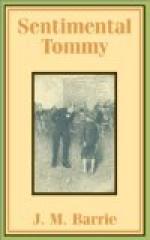“Poor Esther!” said Mrs. Sandys gaily.
“Oh, and I forgot this, mother. Jean Myles’s reason for not telling where she bides in London is that she’s so grand that she thinks if auld Petey and the rest knowed where the place was they would visit her and boast as they was her friends. Auld Petey stamped wi’ rage when he heard that, and Martha Scrymgeour said, ‘Oh, the pridefu’ limmer!’”
“Ay, Martha,” muttered Mrs. Sandys, “you and Jean Myles is evens now.”
But the passage that had made them all wince the most was one giving Jean’s reasons for making no calls in Thrums Street. “You can break it to Martha Scrymgeour’s father and mither,” the letter said, “and to Petey Whamond’s sisters and the rest as has friends in London, that I have seen no Thrums faces here, the low part where they bide not being for the like of me to file my feet in. Forby that, I could not let my son mix with their bairns for fear they should teach him the vulgar Thrums words and clarty his blue-velvet suit. I’m thinking you have to dress your laddie in corduroy, Esther, but you see that would not do for mine. So no more at present, and we all join in compliments, and my little velvets says he wishes I would send some of his toys to your little corduroys. And so maybe I will, Esther, if you’ll tell Aaron Latta how rich and happy I am, and if you’re feared to say it to his face, tell it to the roaring farmer of Double Dykes, and he’ll pass it on.”
“Did you ever hear of such a woman?” Tommy said indignantly, when he had repeated as much of this insult to Thrums as he could remember.
But it was information his mother wanted.
“What said they to that bit?” she asked.
At first, it appears, they limited their comments to “Losh, losh,” “keeps a’,” “it cows,” “my eertie,” “ay, ay,” “sal, tal,” “dagont” (the meaning of which is obvious). But by and by they recovered their breath, and then Baker Lamsden said, wonderingly:
“Wha that was at her marriage could have thought it would turn out so weel? It was an eerie marriage that, Petey!”
“Ay, man, you may say so,” old Petey answered. “I was there; I was one o’ them as went in ahint Aaron Latta, and I’m no’ likely to forget it.”
“I wasna there,” said the baker, “but I was standing at the door, and I saw the hearse drive up.”
“What did they mean, mother?” Tommy asked, but she shuddered and replied, evasively, “Did Martha Scrymgeour say anything?”
“She said such a lot,” he had to confess, “that I dinna mind none on it. But I mind what her father in Thrums wrote to her; he wrote to her that if she saw a carriage go by, she was to keep her eyes on the ground, for likely as not Jean Myles would be in it, and she thought as they was all dirt beneath her feet. But Kirsty Ross—who is she?”
“She’s Martha’s mother. What about her?”
“She wrote at the end of the letter that Martha was to hang on ahint the carriage and find out where Jean Myles bides.”




